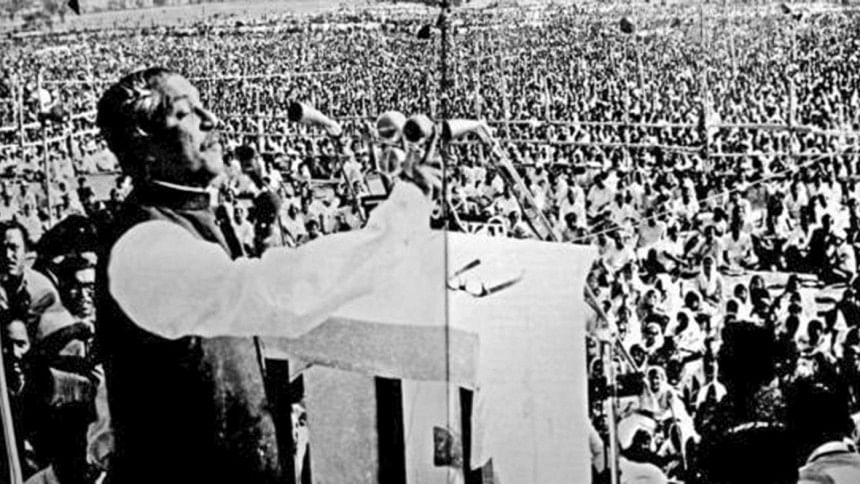7TH MARCH SPEECH and Preamble of our Constitution

The historic speech of the father of the nation, Bangabandhu Sheikh Mujibur Rahman on the 7th March, 1971 was placed in the fifth schedule of Bangladesh Constitution through fifteenth amendment. Thus this historically significant document formally became a part of our Constitution. Apart from its historic value, it is mostly significant for its use as a reliable tool to interpret the operative part of the Constitution, i.e. the preamble.
The preamble of Bangladesh Constitution reads as “We, the people of Bangladesh, having proclaimed our independence on the 26th day of March, 1971 and through a historic struggle for national liberation, established the independent, sovereign People's Republic of Bangladesh.” The spirit of our Constitution derives from our historic “struggle for national liberation.” Therefore, the terms “historic struggle” and “national liberation” demands a clear understanding to realise the said constitutional spirit.
The “historic struggle” was livingly sketched in the 7th March speech. Bangabandhu said that “the history of the past twenty three years has been the history of a persecution of the people of Bengal, a history of the blood of the people of Bengal. This history of the past twenty three years has been one of the agonising cries of men and women.” He remembered the glorious political movements of the people of Bengal as examples to make the term more clear namely 1952's Language Movement, 1954's Election, 1958's Martial Law Proclamation, 1966's Six Points Movement, 1969's People's Uprising Movement, 1970's Election and Movement for Parliamentary Democracy. He concludes his speech with the words “The struggle this time is a struggle for emancipation.” Therefore national liberation denotes emancipation of the people from all the misdeeds against which we had to struggle for a period of 23 years. Thus it bears a message that unless we succeed in ensuring the said “national liberation” our journey towards constitutionalism will be futile.
The high ideals of nationalism, socialism, democracy and secularism have been mentioned in the preamble as the fundamental principles of the Constitution. The 7th March speech provides with the best illustrations for better understanding of those ideals.
“Secularism” has been illustrated in this speech as religious harmony. He says,“… in our Bengal, everyone, be he Hindu or Muslim, Bangalee or non-Bangalee, is our brother. It is our responsibility to ensure their security.” Bangabandhu further warns if we fail to do so our good name must be sullied.
“Nationalism” stands synonymous to unity in his speech when he warned oppressors saying, “You cannot keep seventy five million people in bondage.” He taught us where to keep nationalism and said “Now that we have learnt to die, no power on earth can keep us in subjugation.”
“Democracy” according to his speech lies in popular sovereignty and is carried on by their will alone. He conveyed a simple message to the military rulers regarding democracy which is that “power must be transferred to the elected representatives of the people.” The speech of 7th March for the first time hit the typical concept of democracy as majority's decision and gave it a new dimension by saying “despite our being in a majority, if anyone proposes anything that is legitimate and right, we would accept his proposal.” Hence, the righteous minority got protected against the wrongful majority.
He meant “socialism” as the emancipation of the poor people. Even while calling for countrywide strike he was pretty conscious about their toils. He directed, “In order that the poor do not suffer, in order that my people do not go through pain, all other activities will continue, will not come within the ambit of the general strike from tomorrow. Rickshaws, horse carriages, trains and river vessels will ply. Employees will collect their salaries on the twenty-eighth.” Thus, he made an example of pro-people (poor) state.
Recently the UNESCO has recognised this speech as the world's documentary heritage. Now it's our turn to understand our Constitution in the light of 7th March speech and implement its spirit to the fullest possible degree.
The writer is a Lecturer, Department of Law, Northern University Bangladesh.

 For all latest news, follow The Daily Star's Google News channel.
For all latest news, follow The Daily Star's Google News channel. 



Comments